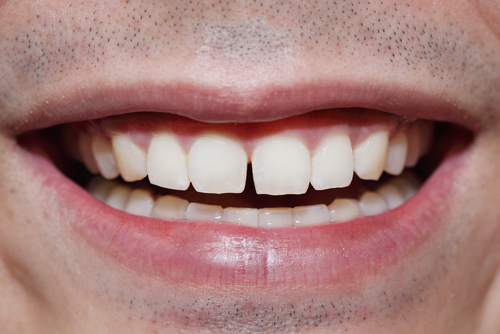The Purpose of Dental Bonding
When you have an unsightly tooth or one with minor damage, it mars the appearance of your smile. What’s even more important, though, is that these problems can lead to bigger complications if left unaddressed. At Smiles by the Sea in Hampton, NH, we use dental bonding to correct problem teeth quickly, easily, and affordably.
What is dental bonding?
Dental bonding is a term we typically use for what we call composite restorations. Bonding means attaching something to a tooth structure. Composite restorations, which are resin restorations, use bonding materials as their foundation. Since we bond them to the tooth structure, the term dental bonding arises. This is what most patients refer to as dental bonding or composite or tooth color restoration. They are essentially the same thing.
Patients love dental bonding because it is non-invasive and fast. Getting cosmetic tooth bonding only takes one visit to your Hampton dentist and requires only about 30 minutes to an hour per tooth to complete. It’s an excellent solution for both adults and children, and especially for patients who are hoping for an alternative to a dental crown or porcelain veneer.
When is dental bonding recommended?
There are a few scenarios where dental bonding could be recommended. One common scenario is if someone has worn-out teeth, some staining on the teeth, or some chipping. Some chipping on the teeth can be resolved by dental bonding. If there's staining, we could address it with dental bonding, depending on the type of stain. To enhance the shape or size of the tooth, we can use dental bonding. If there's a cavity on a front-facing surface of the tooth, we can use dental bonding to remove that cavity and restore the tooth structure. These are some scenarios where dental bonding is recommended.
Problems Fixed by Bonding
 There are many problems that can be addressed by dental bonding, including:
There are many problems that can be addressed by dental bonding, including:
- Broken teeth
- Chipped teeth
- Cracked teeth
- Decayed teeth
- Discolored teeth
- Gapped teeth
- Jagged teeth
- Misaligned teeth
- Misshapen teeth
Bonding is often used in place of another repair, especially for patients who might be concerned about budget. For example, if you lost an old porcelain crown, dental bonding may be a viable solution to build the tooth back up and save you both time and expense. Your Hampton dentist will also make the most logical recommendations for your unique oral health needs.
Dental bonding can last for decades, but the resin is susceptible to staining. It’s important to keep up with your oral hygiene routine at home and see your Hampton dentist every six months for a professional cleaning and check-up. This will keep your bonded teeth looking great, and the rest of your smile too.
What are the advantages of dental bonding?
One of the biggest advantages of dental bonding is that it can be a minimally invasive procedure, especially when used for enhancing the tooth structure, such as the shape of a misshaped tooth. We add bonding material instead of cutting the tooth structure or doing anything else to the tooth. In this case, it's a minimally invasive process to enhance the shape or size of the tooth. It's mostly an additive process to the tooth.

Do bonded teeth look natural?
Yes, bonded teeth can look very natural. Most of the time, when we perform dental bonding, it is to enhance the shape, aesthetics, and beauty of the tooth. We match the color of the bonding material to your tooth structure. Once the process is finished, your tooth looks very natural.
What is better: dental bonding or veneer?
It depends on the treatment recommendation. Why are we recommending bonding versus veneer? Dental bonding could be advantageous and better in one scenario versus the other. For example, if the tooth structure is really worn or in an area where we need more function and strength, a dental veneer would be more suitable because they are stronger restorations and last longer.
In cases where less strength is needed and the area is smaller, dental bonding would be better. The best option is to consult your dentist, have an evaluation done, and your dentist will provide treatment options based on your case scenario. They will discuss the pros and cons of each option and what is better for you.
Is dental bonding painful?
Dental bonding is not painful. As with other treatments, if your tooth has been sensitive, your dentist will ensure you are comfortable. If there is any sensitivity or if we expect some sensitivity during the procedure, we will make sure you are anesthetized and numb, ensuring the procedure is comfortable with no pain or discomfort.
The Dental Bonding Procedure
Cosmetic tooth bonding is a comfortable and non-invasive procedure. There is rarely a need for drills or anesthesia during this dental, unless your repair involves the removal of tooth decay. The results of bonding are subtle but effective and here is how it’s usually done:
- Preparation: The problem tooth is lightly sanded and conditioning liquid is applied so the resin can attach to the tooth.
- Application: Tooth-colored resin, a putty-like substance, is matched to the shade of your teeth and brushed over the tooth in coats to build up the tooth structure.
- Bonding: A special laser or ultraviolet light is used to harden the resin in place and bond it permanently to the tooth.
- Contouring: The bonding material is carefully shaped to look like a natural tooth in size or its form is contoured to fill in a gap.
- Polishing: The tooth is buffed until it is smooth, shines, and looks completely natural.
Bonding is a great repair for patients who are seeking an easy and fast way to fix a tooth. There is no need to wait for a dental lab to prep the materials to fix your smile. The dental bonding procedure is all on your Hampton dentist and her expertise to reshape, correct, and beautify damaged or unsightly teeth to return your tooth to full function.
Can I brush and floss my teeth after dental bonding?
Yes, you can brush and floss your teeth after dental bonding. In some scenarios, if you were anesthetized, your dentist will give you special recommendations, such as waiting for a certain period to avoid biting your cheek, lips, or tongue. Otherwise, you should be able to brush and floss your teeth right after the bonding process. Once it's cured, it's fully set, and you're ready to go.
How long does dental bonding last?
The longevity of dental bonding can vary from person to person and also depends on the area where the bonding has been done. Typically, dental bonding can last anywhere from 5 to 15 years. I have personally seen cases where dental bonding lasted 17 years, even 20 years.
The key to longevity, as with other dental procedures, is maintenance. Ensure you're brushing, flossing, going for regular checkups, and getting regular cleanings. Maintenance is crucial for the longevity of your dental bonding. Maintain good oral hygiene and go for your visits to maximize the lifespan of your dental bondings.
Is dental bonding covered by dental insurance?
The answer depends. Some insurances might cover dental bonding, and some might not. Similar to cosmetic dentistry procedures, if it's classified under cosmetic dentistry, your insurance might not cover it. The best approach is to consult your dentist.
At our office, we will evaluate why it's needed and let you know if we expect your insurance to cover any part of it. Schedule a consultation, let us evaluate it, and we can confirm whether it's a covered procedure or not.
Get Dental Bonding from Your Hampton Dentist
If you have a problem tooth, don’t neglect it. You may be willing to live with the issue or the cosmetic blemish, but even the most insignificant matters can turn into major dental problems. It’s far wiser to get a small restoration than find yourself having to endure an invasive restoration later because the tooth developed a bigger problem.
No matter what your oral health concern, there is a dental solution to fix it. The sooner you take care of the matter, the better. Dental bonding could be the right repair for you. Contact Smiles by the Sea in Hampton, NH, to schedule your consultation.
If you’re searching for quality dental care, we’re here to help. Call (603) 634-9445 or email [email protected] to schedule your visit. Our team is committed to keeping your smile healthy.

